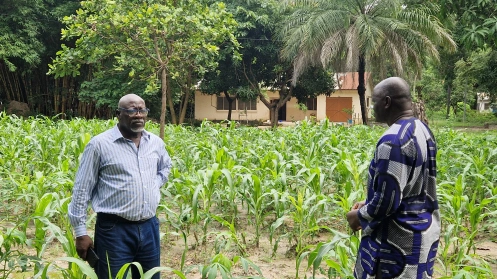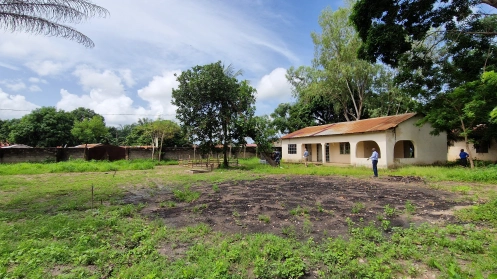23 September 2024
Enhancing Agricultural Development and Self-sustainability in The Gambia

Above: Methodist Mission Agricultural Programme (MMAP), Brikama.
Since the start of the Methodist Mission in The Gambia, agricultural training and provision has gone hand in hand with Education to improve the lives of the local people. With increased environmental problems due to Climate Change and degradation of the land through indiscriminate felling of trees throughout the country, the need for land conservation and agricultural training has increased. Whilst the Methodist Mission in The Gambia was involved in agriculture since the very beginning, a persistent drought between 1970 and 1980, combined with the effects of indiscriminate tree-feeling led to the creation of the Gambia Christian Council Agricultural Project in 1974 by British agriculturalist, Bob Mann. The stipulated aims were:
a) To improve farmer’s income through food production and establishment of vegetable gardens.
b) To protect the environment through tree planting, and
c) To provide water for vegetable growing and tree planting through the construction of wells.
Funding for these projects came through the World Council of Churches (WCC) and the then Methodist Church Overseas Division (MCOD) and has continued through the World Mission Fund. Agricultural projects all took place in the Kombo Western Circuit region, centred on what became the Methodist Mission Agricultural Programme (MMAP) at Brikama, where about 30 acres of land was set aside to promote food production, tree planting and training in protecting the environment. All of these initiatives were income-generating and had a multiplying effect in the region. Additionally, a great number of new wells were constructed.
When I visited in 2022, the MMAP had sadly gone into serious decline. The 30-acre plot of land was no longer producing anything and had grown wild. The wall around the property had fallen down and there was much trespassing and disposal of rubbish on the land. This was a tragic state of affairs since it is the largest and only piece of natural habitat in the whole of the Greater Banjul area. The Bishop and Connexional team recognised the need for a radical, bold and ambitious vision for this significant plot of land as an exemplary model and resource for The Gambia of land conservation, natural forest preservation, environmental education and food production.
It was inspiring to visit the MMAP in September 2024. Under a new Director, Edmund Shonobi, huge improvements have been made. Developments include:
- The clearing of dead trees and overgrown land to start plantations of fruit and vegetable. (Using the wood from the clearing to make charcoal for sale).
- 136 metres of new wall built on the southern boundary, meaning that the site is now protected and can be developed.
- The purchase and nurturing of 500 Palm Oil seeds (with a further 500 planned), to start a Palm Oil plantation on a section of the land that had become fallow.
- Growing Cashew nuts, mango trees, oranges and lemons in another part of the plot.
- Using the natural forest to create a nature pathway – and install beehives deep within the forested areas to start honey manufacturing.
- Clearing a plot of land (50m x 50m) to produce a banana and plantain plantation.
- The planting of a section of the land for growing vegetables, including a processing plant.
- Converting a ruined block on the property into a piggery and creating a compound (23m x 17m) for pigs, with initially 20 pigs (2 boars, 10 females for breeding and a further 8 for growing and selling), with the idea of expanding the pig business.
Significantly, part of the final Capacity Building Grant from MCB’s World Mission Fund to Gambia (£25,000) has been allocated to MMAP. This is being used to construct a three-roomed block on the edge of the compound by the road, to build a butchery, shop and pork sales outlet. This is being situated close to an already existing but dilapidated building overlooking the site.

This will be converted into a café and meeting area so that people can enjoy the fruits of the land, at the start or end of a walk around the property, either for leisure or educational purposes, to see the ways in which the 30-acre site is being used for multiple agricultural and conservational purposes.
If you wish to learn more about our global partners or enquire about Twinning or any of the other opportunities offered by our partnership with the worldwide Church, contact: gr.admin@methodistchurch.org.uk.
And if you would like to contribute to the World Mission Fund, click the link.